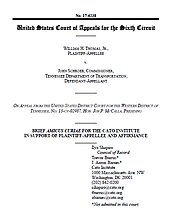Based on the 2015 Supreme Court case of Reed v. Town of Gilberti, the federal district court ruled this on‐premises/off‐premises distinction to be a content‐based regulation subject to strict scrutiny, ultimately finding it to violate the First Amendment. Cato certainly agrees with this outcome, and we have now filed a brief supporting it after Tennessee appealed to the U.S. Court of Appeals for the Sixth Circuit. Our basic point is this: Regardless of whether the court applies “strict scrutiny” or some lesser form of review, the statute is unconstitutional because of an insufficient fit between the ends the state claims to pursue and the means it uses.
While strict scrutiny requires the government’s interest to be “compelling” and the means employed to be the least restrictive possible, lesser scrutiny employs a somewhat more forgiving standard; a narrowly tailored regulation must directly advance the government’s “substantial” or “significant” interests.
Unlike similar statutes in other states, Tennessee’s Billboard Act applies even to noncommercial speech. In fact, the unauthorized sign at the center of this case was overtly noncommercial, featuring an American flag combined with Olympic rings in one instance and a reference to the holiday season in another. But because the tests for content‐neutral regulations and commercial‐speech restrictions are virtually identical, we used examples from both of these types of cases to drive home the idea that this law fails constitutional muster.
While Tennessee identified traffic safety and the aesthetic beauty of its highways as reasons for its law, neither interest is well‐connected to the Billboard Act’s on‐premises/off‐premises distinction. Not only did the evidence that the state offered range from unsupported assertions to irrelevant witness testimony, but the statute and accompanying regulations were also completely irrational. For example, while the law would allow large, unsightly, highly distracting on‐premises signs, it would ban small, unobtrusive off‐premises signs. The associated regulations are even more ridiculous, actually attempting to make a legal distinction between service stations’ advertising “accessory” products like tires and “incidental” products like cigarettes.
Further, although lesser scrutiny doesn’t require the government to use the absolute “least‐restrictive means” possible, the existence of numerous viable alternatives that impose less of a burden on free speech provides good evidence that the means‐ends fit is lacking. For example, rather than imposing the nonsensical on‐premises/off‐premises distinction, the state could regulate the size, height, color scheme, font, and spacing between all roadside signs to prevent distracted driving and scenic degradation.
Finally, the statutory text and overtly commercial context of the regulatory scheme makes it nearly impossible for any noncommercial speech to qualify as “on‐premises.” And since on‐premises signs constitute the major exception to the statute’s restrictions, this means that the Billboard Act actually restricts noncommercial speech to a far greater extent than its commercial counterparts. Worse still, the on‐premises/off‐premises distinction imposes an especially disproportionate burden on one of the most highly protected forms of speech: the free expression of ideas.
Because the Billboard Act neither directly advances Tennessee’s interests in traffic safety and beautiful roads, nor qualifies as a “narrowly tailored” regulation, the Sixth Circuit should uphold the district court’s ruling and toss the statute. Regardless of whether the court applies “strict,” “intermediate,” or some other kind of scrutiny, the Billboard Act is a clear First Amendment violation.



